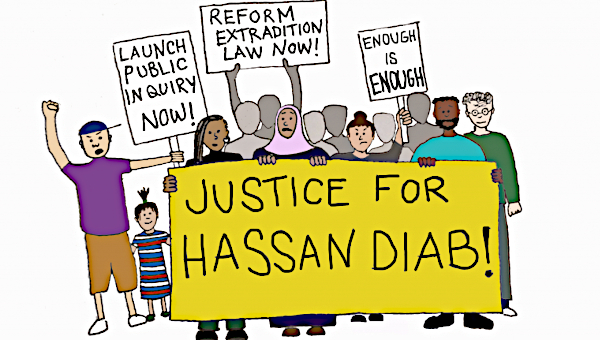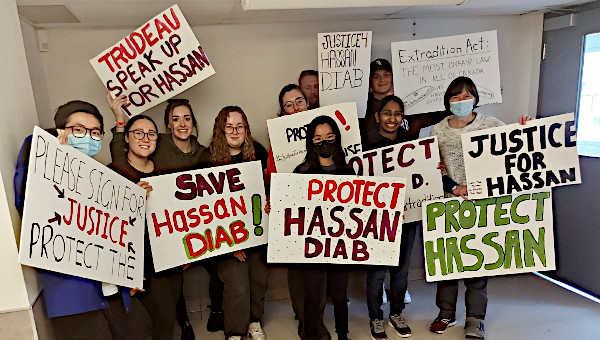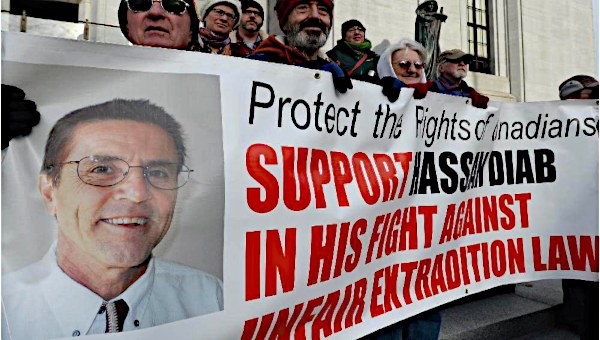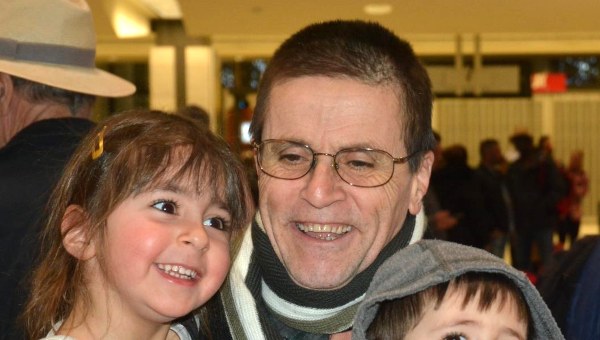The Diab Affair: Why Canada Must Say No to France
Open Letter to Justice Critic Randall Garrison
The fate of Dr. Diab hangs in the balance. More than four months have elapsed since France sentenced him to life in prison. France has most likely submitted its second extradition request. Will Canada accept or refuse it? Will Trudeau honour his commitment (4:57-5:20) to ensure that Hassan Diab does not suffer the ordeal into which he was plunged in 2014? It’s impossible to say. Throughout these past months, Trudeau and his Liberal government have remained tight-lipped.
Almost a decade ago, Dr. Diab was extradited to France on discredited handwriting “evidence” – five words in block letters – falsely incriminating him for the 1980 bombing of a Paris synagogue. For more than three years, and without formal charge, Dr. Diab languished in prison until French investigative magistrates found no evidence of guilt and released him. In 2021, however, the decision to release Dr. Diab was successfully appealed. That same year, he was ordered to stand trial.
Conducted in absentia, his trial in April 2023 lasted a mere three weeks. It was a staged event in a court of no record. The 31-page guilty verdict had been prepared in advance. The prosecutors were allowed to vilify the accused, filibuster, and steal the defense’s speaking time. The presiding judge ignored Dr. Diab’s alibi and prosecutors suppressed vital exculpatory evidence. An innocent scapegoat, Dr. Diab was convicted to life in prison for a crime he did not commit.
But this egregious miscarriage of justice did nothing to spur the former Justice Minister David Lametti into action: i.e., rescue Dr. Diab from endless persecution by rejecting France’s rigged verdict. Obdurately silent, he left Dr. Diab hanging in limbo for three months, wondering whether a second extradition request from France would be refused or accepted.
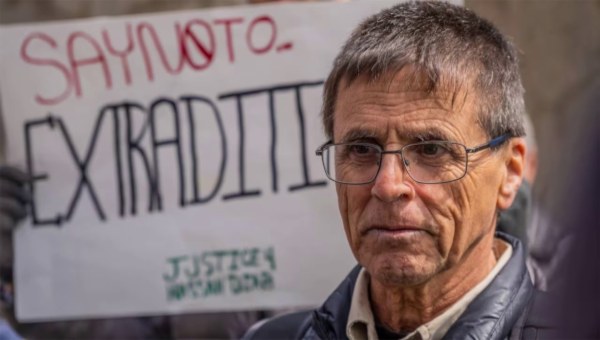
Throughout his tenure, Lametti adopted a wait-and-see approach to the Diab file, even though he was invested with extraordinary powers to stop France in its tracks and terminate the case instantly. Claiming that he was simply following the rules, he hid behind legalese and sacrificed Dr. Diab on the altar of the extradition law. If, in 2021, it was easy to opt for a wait-and-see approach – and this despite the appeal of 121 legal scholars and lawyers – in 2023, after parliamentary hearings led to a detailed report for extradition reform (unanimously endorsed by Parliament’s Standing Committee on Justice and Human Rights), Lametti could no longer use a defective piece of Canadian legislation as an excuse for his dilatoriness.
When the newly appointed Minister of Justice Arif Virani replaced Lametti in July of this year, there was hope that he would act more swiftly than Lametti did. Many wondered whether Virani would resolve the Diab Affair (18:19-22:53). Efforts to galvanize the government during the summer lull intensified. A letter was sent to Virani on July 26. Days later, a letter was sent to Deputy Prime Minister Chrystia Freeland. Each of these appeals demanded action: i.e., immediate refusal of France’s extradition request. But there has been no reply to date.
Mr. Garrison, I write to you today with the utmost urgency. I am appealing to you for more concerted advocacy in the ongoing effort to free Hassan Diab from his current calvary. I turn to you, as I have turned to your colleague, Heather McPherson (see my letter to her, signed by more than 725 Canadians and more than 20 organizations), because you spoke out on April 21, 2023 in Dr. Diab’s defence, demanding that Canada block what then appeared to be France’s imminent second extradition request.
It is voices like yours – voices emanating from the NDP, which holds the balance of power – that inspire hope in Dr. Diab and in those struggling alongside him for a just resolution to the miscarriage of justice that has blackened 15 years of his life, leaving him with an abominable sense of dejection, the feeling of sitting on death’s row.
In February of this year, during the parliamentary discussions on extradition reform, conducted by the Standing Committee on Justice and Human Rights, you proved to be a vocal critic of the current (1999) extradition law. In the context of those discussions, the Diab file was raised repeatedly as an iconic instance of the extradition law’s significant defects. Since then, the standing committee unanimously agreed to push for reform and it published a powerful report to that effect.
This development was very encouraging, as was your meeting with the former Minister of Justice David Lametti, regarding the Diab file. But while such significant interventions were promising at the time, the fate of Dr. Diab today remains as uncertain as before. My letter to your colleague, Heather McPherson, details the number of initiatives that Hassan Diab’s supporters carried out over this past summer, be it through rallies, petitions, letters to Prime Minister Justin Trudeau, to the recently appointed Minister of Justice Arif Virani, and to the Deputy Prime Minister Chrystia Freeland. With the exception of the PMO’s office, which directed the Diab matter to the office of the Minister of Justice, there has been no response from any of these – no word indicating the direction of Dr. Diab’s fate, not even an acknowledgement of receipt. Canadians who have been apprised of the Diab Affair, or who have followed this case from its inception, are growing increasingly suspicious of this silence.
Indeed, the government’s silence raises numerous questions, among which the most obvious: what are the upper-level ministers of the Liberal Government waiting for? What is impeding them? Might the International Assistance Group (the IAG), the lesser-known, but powerful, department within the Ministry of Justice, which originally helped to get Diab wrongfully extradited in 2014, be stymying the government’s efforts to refuse a second extradition request? One could speculate endlessly. Indeed, there may be countless issues underpinning the Government’s quandary – issues that will remain in large part held under wraps. But there are also powerful legal, political, and moral reasons why Canada can and must save Dr. Diab from a second extradition – despite pressure from some quarters to see him consigned to oblivion.
1. There is incontrovertible exculpatory evidence that underscores Diab’s innocence:
Between 2017 and 2018, two French (counter-terrorist) investigative magistrates concluded – following three years of scrupulous examination – that there was absolutely no evidence (p.69) to send Dr. Diab to trial let alone convict him. Their findings corroborated his alibi. He was in Beirut during the bombing of the Paris synagogue. All of the fingerprint analyses excluded Dr. Diab. In 2023, the two magistrates testified at the Copernic trial and reaffirmed their position.
2. France has violated international law:
For over 15 years, France has persecuted Dr. Diab mercilessly. During that time, it violated the United Nations International Covenant on Civil and Political Rights (ICCPR), since it contravened the covenant’s requirements: i.e., fair criminal investigation and trial procedures. In 2023, it conducted Dr. Diab’s trial on the grounds of pure hearsay – undocumented, unsworn, and unsourced foreign intelligence, unfit in a Canadian court. The trial unfolded without public record. It was suffused with fictions, perjury, and disavowal. Meanwhile, Dr. Diab’s exculpatory evidence was flatly suppressed.
3. In the Diab case, France has proven to be an unworthy extradition partner:
- In 2008, when France submitted its record of the case to Canada, it claimed there were no usable fingerprints on the hotel card that the suspect had signed. In fact, the suspect’s fingerprints were discernible, and France already knew this in 2007. In November of 2008, after the RCMP had Diab’s fingerprints examined at France’s request, the French investigative judge learned that Diab’s fingerprints did not match those of the bomber, but he consciously withheld this exculpatory information in his final (December) submission of the record of the case.
- In 2008, France claimed to be ready for trial when it was not;
- In 2021, France submitted a shoddy Appeals Court ruling report based on speculation and fanciful invention;
- In 2023, France sentenced Dr. Diab to life in prison without a shred of concrete proof. The Copernic trial of April 2023, conducted in absentia, was a sham.
4. There is no comity in Canada’s extradition treaty with France:
Canada’s extradition treaty with France is not reciprocal. Canada extradites its own nationals, but France does not. The relationship is also marked by double standards: i.e., France has allowed Priest Johannes Rivoire to be left in peace despite his history of sexual crimes against
Canada’s indigenous peoples, while Hassan Diab is under relentless persecution, even as his powerful alibi and fingerprint evidence excludes him from the crime of Copernic.
5. Minister of Justice Arif Virani should not yield to those in the Department of Justice (e.g., persons in the International Assistance Group – the IAG) likely seeking Diab’s second extradition:
- Canada’s International Assistance Group (IAG) abetted a wrongful extradition of Diab in 2014.
Crown attorneys of the IAG exploited a loophole in the 1999 extradition law that allows exculpatory evidence to be suppressed (p.29). The attorneys used this loophole to withhold Diab’s exculpatory evidence from the then extradition judge Robert Maranger, misleading the latter and encouraging him to use flimsy handwriting evidence as grounds for committing Diab to France.
- In 2021, there was no new evidence against Diab, nor is there any today in 2023.
In 2011, Canada jettisoned France’s 2008 record of the case – the material presented to Canada when Dr. Diab was first sought. In place of France’s record of the case, Canada resorted to handwriting evidence in order to justify extradition.
In 2023, in the course of Hassan Diab’s trial, France expunged this same handwriting “evidence,” excising it from its deliberations and final verdict. Meanwhile, it reaffirmed the fundamental narrative of the 2008 record of the case (which Canada had rejected in 2011) and deployed it as the crucible from which the 2023 trial culled its fictions. The latter were largely derived from mere hearsay (i.e., undocumented, unsworn, and unsourced foreign intelligence).
On two sides of the equation, then, material used to vilify and incriminate Hassan Diab has been nullified. There is, therefore, no material on which to launch an extradition process.
- The Justice Minister has “Extraordinary Powers” that can be used now. “In extradition matters, the courts act only in an advisory capacity. As soon as the Minister of Justice decides to exercise his/her discretion to say “enough is enough” in an extradition case, the extradition is over, because under s. 23 of the Act, the judge is then compelled to discharge the person facing extradition” (Gary Botting,“Hassan Diab deserves better from the justice minister,” Legal Matters, May 31, 2021).
The Hassan Diab case demands Arif Virani’s immediate intervention. The Justice Minister has the power to act forthwith. “Parliament [has given him] full discretion not only to reject extradition requests out of hand but also to terminate them when to proceed appears to be against the national interest. This unusual provision, repeated in sections 14, 23(3) and 48(1) of the Extradition Act, is founded on the notion that extradition is not at base a legal or judicial issue, but rather is political in nature” (Gary Botting,“Hassan Diab deserves better from the justice minister,” Legal Matters, May 31, 2021).
Given sections 14, 23(3) and 48(1) of the Extradition Act, Prime Minister Justin Trudeau and Deputy Prime Minister Chrystia Freeland have the political prerogative to support Justice Minister Arif Virani by saying No to France’s extradition request. Your party leader Jagmeet Singh, Foreign Affairs Critic Heather McPherson, and you, sir, as Justice Critic, along with your entire party, have every reason – nay, every duty – to weigh in and endorse this same position.
*
The Diab Affair is an egregious example of foreign interference in the life of an innocent Canadian. It is high time that the government protected Dr. Diab from France’s merciless abuse and delivered him from a most odious nightmare. To surrender him to an unworthy extradition partner, sullied by mendacity and judicial fraud, would be a national disgrace.
I urge you to raise this matter in the House and to exhort your colleagues both in the NDP and in the Liberal Party to bring the Diab file to a close and to ensure that France’s extradition request is both categorically and unswervingly refused. •


